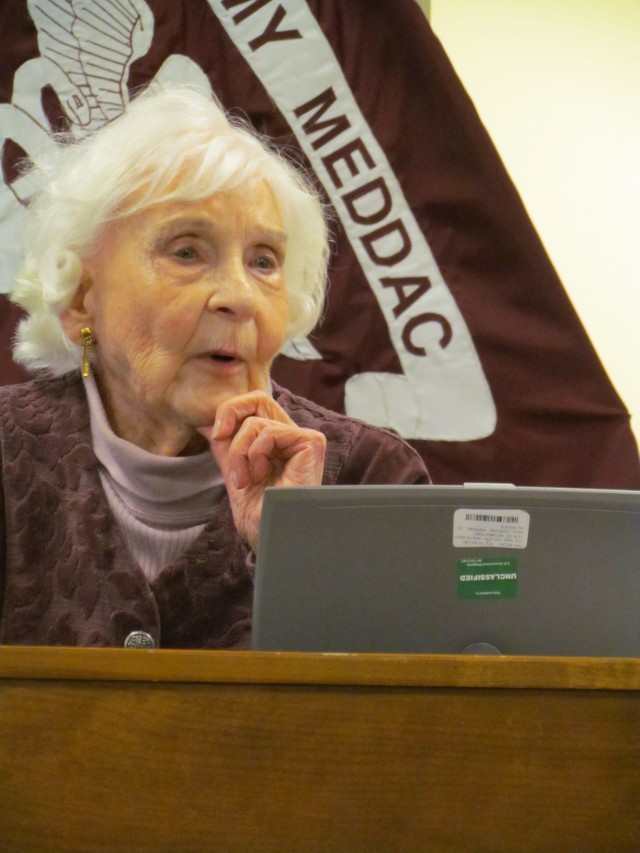REDSTONE ARSENAL, Ala. -- For decades, Maeceille Beem said little about the time she spent serving with the Army Nurse Corps in the last year of World War II.
But on the 110th birthday of the Army Nurse Corps, Beem, a retired colonel, opened up about her experiences to a crowd of fellow Army nurses and those impacted by them at Fox Army Health Center's Army Nurse Corps 110th birthday celebration Feb. 2.
"I am just so proud to have served my country, and so happy and honored that I could take care of those wonderful, wonderful men," Beem said.
Beem was just a young woman when she joined the Army Nurse Corps and made the two-week journey across the Atlantic Ocean to serve in the last year of World War II in Europe. Serving with the Ninth Army, Beem often didn't know where she was headed, but always knew her healing touch would be needed among the wounded U.S. Soldiers.
"They were just so desperately wounded," Beem said. "You worked with them tirelessly. You just wanted to be there. You were so hyped up if you laid down to sleep you couldn't. You just had to get back with them."
Beem's unit saw the worst of the injuries, chest and belly wounds, which were separated into three different tents as they arrived - shock, operating, and post op. As she worked on each young man, they reminded her of the family she had back home, and the importance of her job.
"This is my brother," Beem said she would tell herself as she cared for each young Soldier. "I couldn't stand to see one of them die."
Sadly, the Soldier injuries she saw on the front lines were not the worst of sufferings she would treat. As the war drew to a close, Beem's unit was called to a liberated concentration camp for political prisoners near Halberstadt, Germany, where the nurses cared for the prisoners for two months. Images of the emaciated prisoners have stayed with Beem ever since, their eyes hollow and skin so thin she could number their bones.
"They had just lived for survival for so long," Beem said. "They were down to skin and bones."
They are memories of a time Beem calls "dreary," but serve as a living testament of the men and women that were there to nurse the wounded Soldiers back to health. It is a history members of the Army Nurse Corps are proud to call their own today.
"It's a great living history to be a part of," said Fox Army Health Center commander Col. Elizabeth Johnson, who invited Beem to come speak at Fox's birthday celebration. Johnson, an Army nurse herself, coordinated the event and invited members of the community with a special connection to the Army Nurse Corps, whether they be nurses or patients, to speak to attendees about their experience with the Army Nurse Corps.
"It's important to stop and take time to honor past, present and future and to take a moment to think about the impact we have on each other's lives," Johnson said.
Retired Lt. Col. Jeff Wishik was on the receiving end of the Army Nurse Corps' care when he was hit while serving with a ground unit with the 101st Airborne in Vietnam in 1967.
"The first thing I remember is waking up, looking up, and seeing a young lady, dark hair in jungle fatigues," Wishik said. "My first thought was, 'Angels don't wear jungle fatigues.'"
Wishik would soon come to learn that real life angel's name was Lynn - the woman who would write his family in the middle of the night to let them know Wishik was OK and reassure the Soldier that he was going to make it through. Whether day or night, on or off duty, she could be found checking on him and his comrades, until the day the vehicle arrived to take them to the next medical facility, when she was there to see the doors close.
"She was there," Wishik said. "Angels do wear jungle fatigues."
Nurses have been tending the wounded and bringing the sick back to health since the time of the Revolutionary War in 1775, but it wasn't until 1901 that the Army Nurse Corps became an official part of the Army Medical Department, giving the corps their birthday, Feb. 2. Despite the corps' long history, their impact continues to be felt today as Soldiers defend the freedom and security of the United States in places like Iraq and Afghanistan. Even 110 years later, the Army Nurse Corps pledge to nurse Soldiers back to health again rings true.
"We will help them towards healing in regards to whatever their definition of healing will be at that time," Johnson said.


Social Sharing